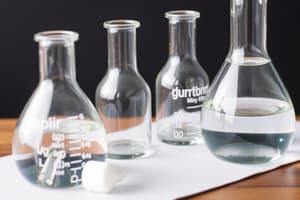Podcast
Questions and Answers
Which of the following is NOT a sign of a chemical change?
Which of the following is NOT a sign of a chemical change?
- Color Change
- Formation of Gas
- Odor Change
- Volume Change (correct)
Which of the following properties depends on the amount of matter present?
Which of the following properties depends on the amount of matter present?
- Hardness
- Color
- Density
- Mass (correct)
Coconut oil is a product extracted from which part of the coconut?
Coconut oil is a product extracted from which part of the coconut?
- Meat and Milk (correct)
- Husk
- Water
- Shell
What is the final product when coconut cream is left to ferment for 1-2 days?
What is the final product when coconut cream is left to ferment for 1-2 days?
Which of the following properties of matter is independent of the amount of substance?
Which of the following properties of matter is independent of the amount of substance?
What process is typically used to separate coconut oil from the rest of the components after fermentation?
What process is typically used to separate coconut oil from the rest of the components after fermentation?
Which of the following would indicate a physical change rather than a chemical change?
Which of the following would indicate a physical change rather than a chemical change?
Which of these statements about homogeneous mixtures is accurate?
Which of these statements about homogeneous mixtures is accurate?
Which type of property do boiling point and melting point represent?
Which type of property do boiling point and melting point represent?
Which of the following describes an endothermic reaction?
Which of the following describes an endothermic reaction?
Flashcards are hidden until you start studying
Study Notes
Properties of Matter
- Characteristics can be observed without changing identity (e.g., density, color, hardness, temperature).
- Characteristics that change identity require a chemical change (e.g., flammability, rusting, reactivity).
Physical vs. Chemical Changes
- Physical changes alter physical properties without changing the substance's identity (e.g., melting ice, boiling water).
- Chemical changes transform substances into new products (e.g., electrolysis of water producing hydrogen and oxygen).
Early Concept of Matter
- Democritus, a Greek philosopher around 400 B.C.E., proposed that all matter consists of indivisible particles called "atomos."
States of Matter
- Four fundamental states of matter: solid (definite shape and volume), liquid (definite volume but no definite shape), gas (no definite shape or volume), and plasma (ionized gas with free electrons).
- Matter can change from one phase to another.
Classification of Matter
- Pure Substance: Fixed composition made of one kind of particle; can’t be broken down by chemical means (e.g., CO2, O2).
- Mixture: Consists of two or more substances combined physically; can be homogeneous (uniform composition) or heterogeneous (nonuniform composition).
Signs of Chemical Changes
- Indicators of a chemical change include color change, gas formation, precipitate formation, odor change, heat release, and light production.
Properties of Matter - Dependent vs. Independent
- Intensive Properties: Do not depend on the amount of matter (e.g., temperature, density).
- Extensive Properties: Depend on the amount of matter present (e.g., mass, volume).
Coconut Palm (Cocos nucifera)
- A large tree of the Arecaceae family, extensively cultivated for its edible fruit in tropical regions.
- Approximately 347 million coconut trees are found in the Philippines, covering roughly 3.6 million hectares of land.
Coconut Oil
- A product derived from the meat and milk of coconut fruit, commonly used in cooking and cosmetics.
- Coconut oil can be extracted at home by processing coconut meat into cream and allowing it to ferment, leading to a separation of oil from curds and water.
Studying That Suits You
Use AI to generate personalized quizzes and flashcards to suit your learning preferences.




